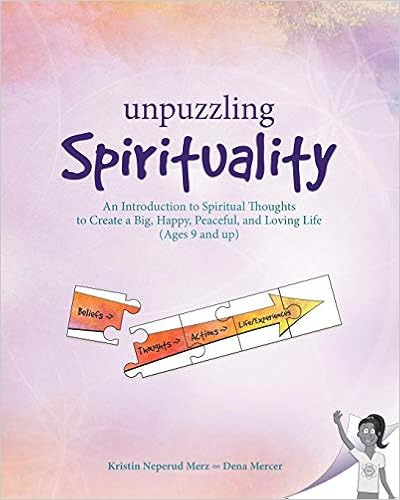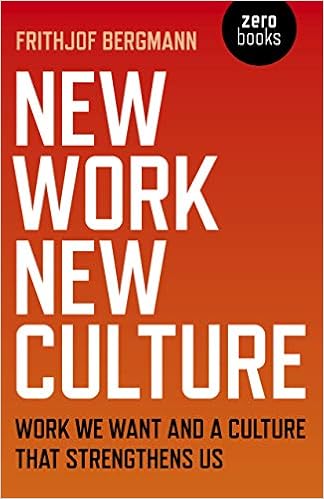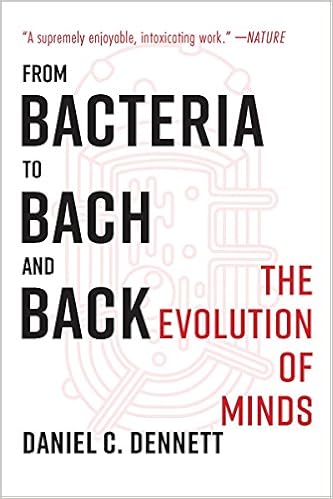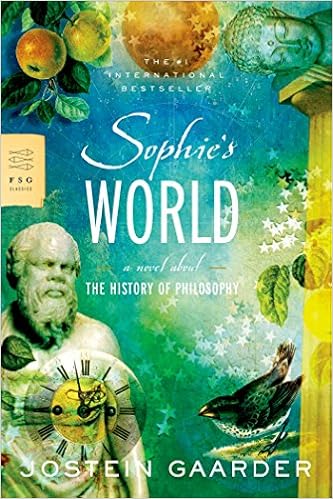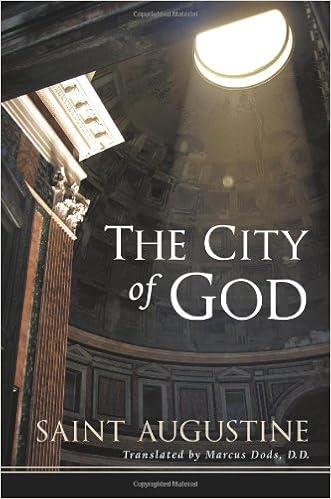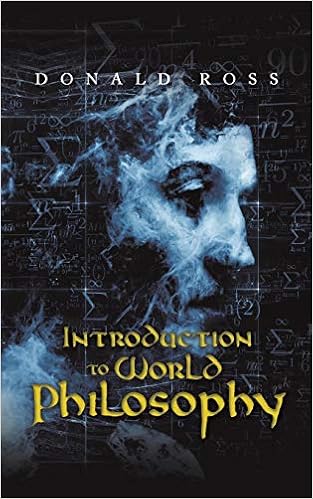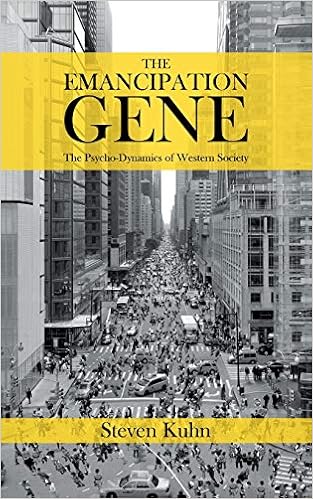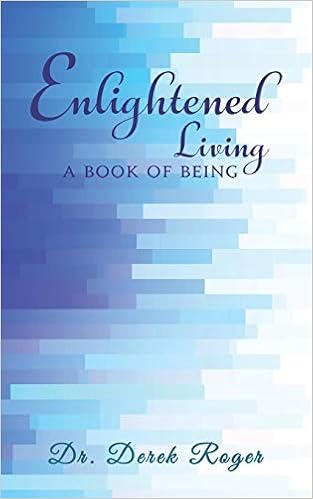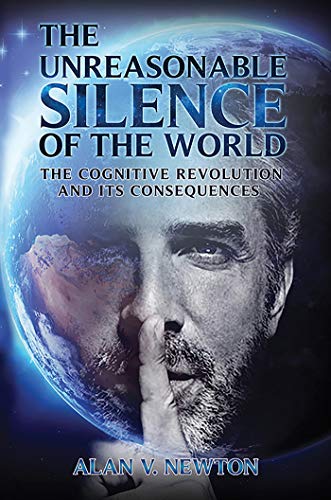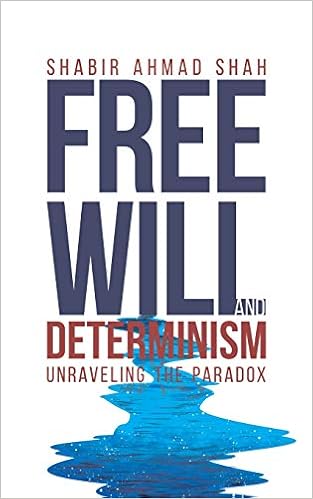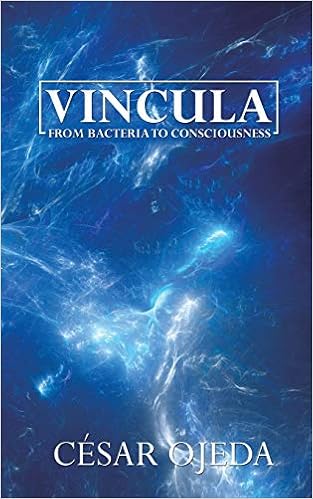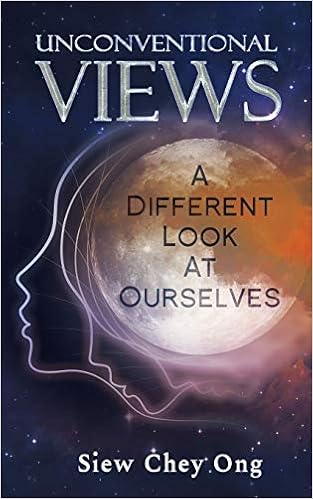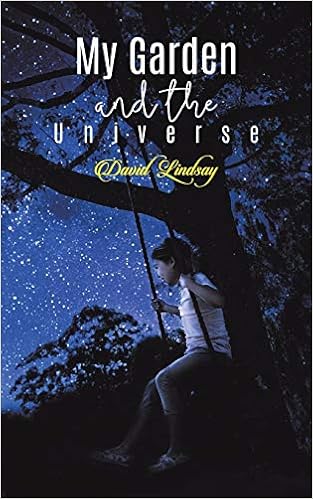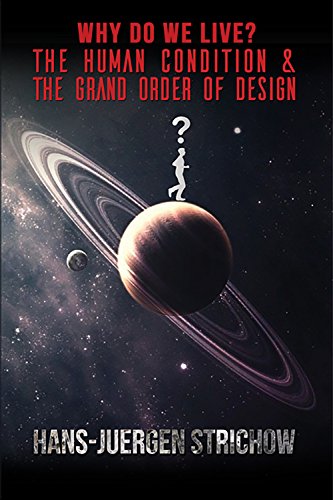For a long while, the philosophy literature has been convoluted and books written in ways that only their authors understand.
That ends now. These eighteen books that we’ve fished out the internet are approachable yet retain the spark that philosophy ignites within our human nature. There’s just something about existence that we NEED to know… Maybe you’ll find out by picking up one of these great beginners books?

Unpuzzling Spirituality: An Introduction to Spiritual Thoughts to Create Big, Happy, Peaceful, and Loving Life (Ages 9 and up) by Kristin Neperud Merz and Dena Mercer is an introduction to spirituality and spiritual thoughts that is presented in a way all ages can understand, and also gives parents a language to be able to talk to their kids about these concepts.
Before buying a copy make sure to compare the price at various outlets:
Book Depository (International)Waterstones (International) Read more reviews and buy the book here

Author Frithjof Bergmann holds a PhD in Philosophy from Princeton University, and is a professor emeritus from the department of philosophy at the University of Michigan.
New Work New Culture is a welcome alternative to the modern insistence that all passions must be realized through entrepreneurship and challenges the reader to imagine an entirely new economic system in which our passions are truly realized not through money-making short-term ventures, but through a complete overwrite of how we think about the job system.
Before buying a copy make sure to compare the price at various outlets:
Book Depository (International)Waterstones (International) Read more reviews and buy the book here

This massively influential work of philosophy is a great starting place for anyone interested in meditating on life’s most important questions. In the book, the Stoic philosopher Seneca shares profound insights that will shape your thinking about friendships, love, tragedy, death, and more.
Before buying a copy make sure to compare the price at various outlets:
Book Depository (International)Waterstones (International) Read more reviews and buy the book here

Philosophy can be an intimidating subject. With an overwhelming number of disciplines and subjects to choose from, not to mention building context by understanding philosophy’s history stretching way back to the ancients, beginners can be left with analysis paralysis. Greek philosophy set the stage for western civilization; Heraclitus, Parmenides, Socrates, Plato, Aristotle—and nearly 3000 years later we’re still arguing about the same topics.
Fast forward to now. With all of human history behind us, what do we now know? What have we learned? From the moment single celled bacteria started a chain reaction of life on this planet, all the way to the complex being and genius mind of Johann Sebastian Bach, Daniel Dennett explains how comprehension bootstrapped itself from mindless bottom-up natural selection. Praised by contemporary academics but written in such a way that a normal person can understand—without specialized training or years of philosophy—Dennett’s key theory breaks down the idea of competence without comprehension. How thinking minds can be very good at doing a variety of tasks, but never truly understand, nor need to understand, why they are doing them.
Comprehension, or understanding, arrises out of the concept of “why?”. Answering “why?” is broken down into two categories, form and function. When we ask “why?” we’re really asking two different things—“how come?” and “what for?”. When we ask a “how come?” question, we are seeking an answer to cause and effect; i.e. why is the ground wet or how come is the ground wet? Perhaps it rained. Once the cause and effect is answered, naturally we then seek to discover function. Why did it rain or what did it rain for? What’s the purpose of rain? At that point you discover an entire ecosystem of function; understanding weather, the use of water by plants and animal, etc. When pursuing “why?”, generally further “home come?” and “what for?” questions arise out of the initial question. The more questions that are answered, the more comprehension one has.
Dennett uses the evolution of comprehension, how and why thinking minds work, and contrasts that against the challenges of artificial intelligence. From Bacteria to Bach and Back is a revelation, a truly mind expanding read that puts into context our entire existence—where we came from and how we arrived here—to where we’ll go and the biggest challenges to developing minds in the future.
Out of many philosophical reads, this one attempts to answer the “how come?” and “what for?” of understanding your mind, and does it with common themes and creative examples that can be appreciated by most casual readers.
Before buying a copy make sure to compare the price at various outlets:
Book Depository (International)Waterstones (International) Read more reviews and buy the book here

What better book to enter such complex subjects as philosophy than this. It’s a compilation in the form of a story that encapsulates all the philosophers and their views in the world. It’s a pretty good book to understand each philosophy by itself. It’s explained for little kids only demonstrating the genius that the author is.
Before buying a copy make sure to compare the price at various outlets:
Book Depository (International)Waterstones (International) Read more reviews and buy the book here

One of the first philosophers that were put to paper and it’s a form of thinking is so remarcable it lingers to this date, Socrates was a visionary, a man who saw the world and explained crystal clear to everyone, we are only catching up to him. Here it is were all started so you should visit this one first.
Before buying a copy make sure to compare the price at various outlets:
Book Depository (International)Waterstones (International) Read more reviews and buy the book here

Plato is a student of Socrates. He is one of the most famous authors in philosophy. The Republic is written in dialogue form and focuses on an ideal country. The book focuses on how a state should perform their duty. Plato has an ideal state in his mind, and he tried to describe it in this book.
Before buying a copy make sure to compare the price at various outlets:
Book Depository (International)Waterstones (International) Read more reviews and buy the book here

One of the most common questions in philosophy is that is man inherently good or bad? The book tries to answer it and highlights a few other issues. It was written after Rome was turned into ashes. The writer focused on why good people suffer in this world. The book also highlights the differences between religions.
Before buying a copy make sure to compare the price at various outlets:
Book Depository (International)Waterstones (International) Read more reviews and buy the book here

What would it be like to go back in time and converse with the great sages of China, of India, of classical Greece and Rome, of the Christian and Islamic worlds, of Europeans of the Enlightenment? This book, Introduction to World Philosophy, aims to communicate some of the excitement and ”mind-stretchiness” that such an encounter would produce. It is intended to engage interested laypersons while remaining faithful to the standards of professional scholarship. It is written in an informal style yet does not talk down to the reader.
Representatives from each of the five aforementioned periods are presented in pairs-one philosopher a more ”head-in-the-clouds” thinker and the other a more ”feet-on-the-ground” one. Besides demonstrating how each tradition offers a range of perspectives rather than a single, dominant one, such an approach achieves an optimum balance between breadth and depth. Ideas found in these texts range from mind-bending metaphysical speculation and the theory of knowledge, to questions of ethics and politics, to points of elementary logic. The whole discussion is prefaced by an extended exploration of what philosophy is.
The author feels that it is important to reach out to the general public, to feed a genuine hunger out there for an accessible guide to the subject, and also acknowledge the relevance of non-Western, as well as Western, cultures to an increasingly globalized world.
Before buying a copy make sure to compare the price at various outlets:
Book Depository (International)Waterstones (International) Read more reviews and buy the book here

From the birth of a conscious being, to the idealistic parenting and fast-evolving social landscape, Steven Kuhn details the culture of vanity and self-obsession and exactly how we ended up that way. The overwhelming self-destruction propagated from the 1980s to the present day has drastically altered fashion, created false idols and over-sexualised our children. Whether it be changes to parenting strategies, sexuality, mass media or an individual s neurobiology, cultural norms in Britain have changed drastically is this progressive or regressive?
Before buying a copy make sure to compare the price at various outlets:
Book Depository (International)Waterstones (International) Read more reviews and buy the book here

The pace of intellectual progress in science and technology in the last 50 years or so has been awesome. Yet, behind all these advances lie two enormous mysteries: ourselves, and where we are in the vast infinity of space. Why are we here, and what is it all about, really? This life is all far too miraculous to be simply a fluke, in which case it seems there must be some other agency responsible for it all, some supreme intelligence to whom we have no access. There are so many unexplained mysteries in this life. It’s a bit like being at a magician’s stage performance. We only see what he wants us to see. In this book, I’ve tried to open the curtains just a crack to peep at what lies behind it all.
This book is not about religion. I do, however, refer to God quite a bit, and although I have thought long and hard about it, I just cannot imagine who or what God might be. I simply use that name as a convenient handle to which I attribute everything that is so unexplainable and inaccessible to us in this life we’ve been given.
Dr. John Marsden grew up in Derbyshire, where he trained as a mechanical engineer. He was the son of a lead miner. After graduating, he was a research lecturer at London University. His interest in general science has led him into many areas of research, from helicopter blade performance to the design of artificial limbs, from which he gained his PhD. After his wife died, he retired to the lovely Isle of Man, where he lives alone.
Before buying a copy make sure to compare the price at various outlets:
Book Depository (International)Waterstones (International) Read more reviews and buy the book here

Have you ever wondered about how best to live your life? Religions claim to have answers, but they are couched in faith and constrained by rituals that make each religion different from the next. The inevitable result has been conflict and war. Enlightened Living is neither religious nor spiritual, offering instead a rational and practical path that is available to everyone. Enlightenment isn’t found by austerity or following rituals but by the sustained practice of observing attachments and letting them go.
Before buying a copy make sure to compare the price at various outlets:
Book Depository (International)Waterstones (International) Read more reviews and buy the book here

It is possible that those with the worst symptoms of madness represent no more than the tip of a neurological iceberg. Madness or, more technically, psychosis, may be part of the human condition rather than a disease. Psychotic genes are considered to have an infinitely graded effect and the lesser degrees of their influence are considered to have had positive effects, which is why they are still in the human genome. Humanity’s unique abilities may have arisen about 100,000 years ago in a neurological revolution caused by a psychotic mutation.
This involved a compromise – the ability to use words, at the expense of a loss of existential confidence. The ancestral response to this loss was to use the new gift of language to construct imaginary scenarios that provided existential assurance and facilitated the imposition of social order. Thus arose mythology and, later, religions.
Before buying a copy make sure to compare the price at various outlets:
Book Depository (International)Waterstones (International) Read more reviews and buy the book here

The worth of a book is rarely determined by its title but the class of a reader is surely determined by what title he or she reads. Although hundreds of books have already been written on this issue, yet the thirst of the people who are curious to its deepest sense have hardly been quenched, for the topic is no less than an abyss where a reader keeps free floating but never in vain; he keeps new layers of meaning and touches new horizons every moment.
The book following the Islamic perspective of the issue Free Will and Determinism on the footprints of stalwarts like Al-Ghazzali, Shah Wali Allah and others, nevertheless, has taken the problem to its uniquely newest horizons where it opens new vistas of research by connecting the divine determinism with philosophical, psychological and genetic determinism in mosaic of free will.
Before buying a copy make sure to compare the price at various outlets:
Book Depository (International)Waterstones (International) Read more reviews and buy the book here

The topic of this book is the nature of human beings as a community of thermodynamic, informational and genomics biological vincula. It is impossible to interrogate this topic without taking into account some underlying issues. What is a biological vinculum? How many kinds of biological vinculum is it possible to describe? Answering these questions requires clarification of specific pre-existing concepts surrounding life itself. Perhaps, the ancient question, ”what is life?”, will never find a definitive response. However, it seems that current answers to this question are different from those offered by classical Greek philosophers, scholastic monotheistic thinkers, or even biologists from four or five decades ago.
Before buying a copy make sure to compare the price at various outlets:
Book Depository (International)Waterstones (International) Read more reviews and buy the book here

The last few centuries have seen increasingly rapid rate of human achievements shaping our civilization. Scientific inventions and discoveries in the fields of information technology, transportation and war weaponry have greatly changed our lives. While our philosophical concepts tended to settle on universally accepted doctrines such as majority rule and democracy in politics and justice, equality and freedom in society, perceptible changes have occurred in recent decades. Unfortunately, every desirable aspect of amelioration of our civilization carries with it a hidden pitfall. We still rightly follow the majority thinking as norm, but there are also unconventional views to ponder.
Before buying a copy make sure to compare the price at various outlets:
Book Depository (International)Waterstones (International) Read more reviews and buy the book here

A fact is immutable and cannot be changed, a truth might explain the reason behind a fact but is open to challenge. The red shift of ancient light is a fact. The explanation that it is caused by a Doppler Effect is a truth. Based upon a conviction that a universe which is perpetually expanding and with increasing efficiency is a perceived truth which is incompatible with the Second Law of Thermodynamics, David Lindsay has gone back to basic physics and philosophically attempted to reconcile the two truths. He has tried to keep the narrative simple (KISS) and comes to unconventional conclusions without denying the fact of astronomical observation or compromising Einstein’s premise that E=mc2.
Noting that one negative observation can cause a scientific truth to be re-appraised, he presents four such observations that might deny the perceived truth of a Doppler Effect causing the red-shifting of ancient light. David’s interpretation of the science recognises that the universe is composed of two primary sources of energy. The potential energy of matter and the chaotic but stable energy of background electromagnetic radiation or light. Both forms of energy are seen as wedded in compliance to the Second Law and Einstein’s principle that mass equals energy and thus offers an explanation (or alternative truth) for the apparent non-compliance inferred by perpetual motion. David Lindsay presents a cogent alternative reason for the red-shifting phenomenon as a new truth, which of course must be open to further challenges. The strength of the philosophical arguments presented is that the four observations are derived from four diverse sources, mathematical, observational, biological and philosophy based on accepted science. The weakness is the lack of experimentation and, until the final pages, a paucity of mathematical proof.
Before buying a copy make sure to compare the price at various outlets:
Book Depository (International)Waterstones (International) Read more reviews and buy the book here

What is the purpose of life? For what reason do we exist? These are the questions Hans-Juergen Strichow addresses in his search for the answer to Why Do We Live? With his thorough analysis of conceptual ideas of physics, metaphysics, survival of the fittest, and the fulfilment of needs and wants, we are not only witnessing a new body of knowledge (or science) relating to why we exist on this planet, but also the existence of a God (or Grand Designer of everything there is), the key to which lies in the irrefutable connection between The Human Condition and The Grand Order of Design. Further proof is provided by ‘Why’ the businesses of industry and government operate the way they do, and what purposes they provide for humanity.
Strichow touches on global crises of poverty, climate control, and economic woes; postulates on the strategy of government, religion, and education; and theorises on the different role players in business. From well-researched fact sharing, and from retelling memories of his own youth, adolescence, and adulthood, we see examples of how symptom bearers and problem solvers will always fluctuate in the way they seek the answer to their Ultimate Purpose in Life.
Before buying a copy make sure to compare the price at various outlets:
Book Depository (International)Waterstones (International) Read more reviews and buy the book here
[mks_toggle title=”Contributors to this article” state=”open”]
Kristin from Unpuzzling Spirituality
Joni Jeffries from JoniJeffries
Calvin Rosser from Life Reimagined
Sean WilliamHammond from SW Hammond
Alberto Navarrete from Frisco Maids
Junaid A. from Brandnic LLC
Janine Hornsby from Austin Macauley Publishers
[/mks_toggle]
